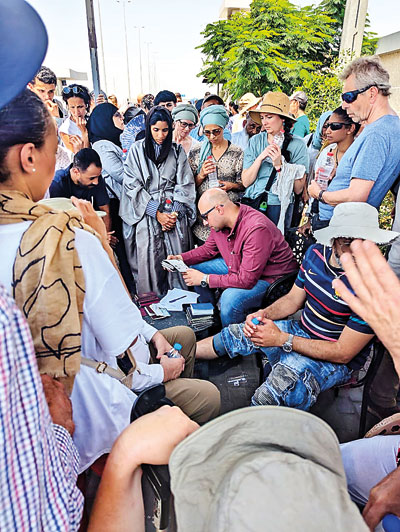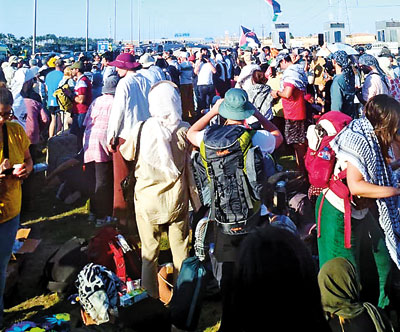Sunday Times 2
Egypt foils Global March to Gaza; Sri Lankan activist among those deported
View(s):By Tharushi Weerasinghe
Thousands of international activists attempting to break Israel’s blockade of Gaza were blocked by Egyptian authorities on Friday as they tried to cross the Sinai with humanitarian aid and reach the Rafah border.
“We were stopped in Ismailia, and our passports were taken from us at the checkpoints,” said Sasha Fathome, who had travelled to Cairo for the march. While activists were initially scheduled to be transported by bus to Arish, the plan was cancelled after a crackdown by Egyptian authorities on Thursday. “We travelled in smaller groups to avoid drawing attention, but two checkpoints like this intercepted our movement.”
Participants staged protests at the checkpoints, demanding the return of their passports and passage through, but the Egyptian authorities had not permitted them to proceed. Riot control forces were also deployed to the area, though sources speaking to the Sunday Times could not confirm whether these agents were armed.
The Global March to Gaza (GMTG)—a civil society-led initiative—brought together activists and civilians from 80 countries who had planned to march to Gaza’s Egyptian border carrying food, medicine, and other aid.
The plan was for participants to travel by bus to El Arish in Egypt’s Sinai Peninsula and then walk about 50 kilometres to the Gaza border, where a protest was scheduled to take place today.
According to the GMTG website, marchers were expected to remain in Rafah until Thursday (19) before returning to Cairo to fly home. The planned route through the Sinai desert includes at least 14 military checkpoints. “I packed my medicines and essentials into a small backpack so it’s easy to carry—and nothing else,” one participant told the Sunday Times. “I don’t know if we’ll get far, but I think it is important for our collective humanity that we try.”
Though 4,000 people had registered online, organisers said actual turnout was expected to be higher due to overland convoys arriving from across the region. One such convoy—known as the “Maghreb Solidarity Convoy” or Sumud—included 2,000 protesters and over 160 vehicles carrying medical and humanitarian supplies and volunteers from Tunisia and Algeria. However, this convoy was also intercepted by Egyptian authorities at the Libyan-Egyptian border and prevented from entering.
Among notable figures taking part were Nkosi Zwelivelile Mandela, grandson of Nelson Mandela, and former U.S. diplomat Hala Rharrit, who resigned in protest over the Biden administration’s Gaza policy.
The disruptions on Friday followed intensified crackdowns the day before, on Thursday (12), the eve of the planned launch. March organisers were forced to alter their plans and instructed participants to remain in their rooms.
The march start time was pushed back from 8 a.m. to noon on Friday due to increased surveillance and intimidation. Plainclothes officers reportedly entered hotels with lists, interrogated activists, searched their belongings, and confiscated their phones. Some were arrested; others were later released.
Internal communiqués obtained by the Sunday Times showed instructions sent at noon directing participants to travel to Al-Ismailyah, the designated meeting point for all delegates. “Please travel in small groups of 3 or 4,” one message read. Activists gathered at the location between 1:30 and 4:00 p.m. Cairo time while organisers “engaged with the foreign ministry about next steps”.

Peace activists were not allowed to proceed beyond Ismailiya by the Egyptian authorities
Hundreds of activists arriving in Cairo were also detained or deported, including entire delegations holding European passports. According to organisers and foreign media, over 200 people were stopped at Cairo airport or questioned in hotels.
Among those deported was Sri Lankan activist Jeana de Zoysa, 29, who was detained upon arrival at Cairo airport. “They pulled everything out of my bag and saw my keffiyeh (the Palestinian scarf that has become a symbol of resistance),” she told the Sunday Times. Her British passport was withheld for over 15 hours, and despite multiple attempts by friends and family to contact the British Embassy in Cairo, no assistance was provided, she said.
Organisers said many participants were held without explanation or access to communication.
While Egypt’s Foreign Ministry reiterated this week that visits to border areas require prior approval through embassies or recognised organisations, GMTG organisers maintained that they had secured all necessary permits. They said there was “no reason” for Egypt to deny them the right to protest.
The GMTG group also clarified on its website that it does not intend to breach any borders or barriers but instead aims to negotiate with Egyptian authorities in collaboration with NGOs, diplomats, and humanitarian organisations.
This marks the second major international effort this month to challenge the blockade. Earlier in the week, the Madleen aid ship, carrying Swedish activist Greta Thunberg, French MEP Rima Hassan, and Al Jazeera journalist Omar Faiad, was intercepted by Israeli forces in international waters.
Since March 2, Israel has imposed a total blockade on Gaza, halting the entry of food, medicine, and humanitarian supplies for over two million Palestinians. The UN has described Gaza as “the hungriest place on Earth”, with over 55,000 Palestinians reported killed in the ongoing conflict. Although limited aid was briefly permitted last month, distribution remains severely hampered by Israeli military operations and logistical barriers. Aid workers have also been directly targeted, drawing widespread international condemnation.

